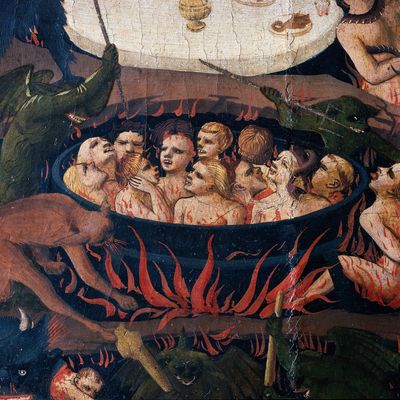
March 30, Good Friday, is for many Christians (particularly Roman Catholics) a day to dwell on the dark side of human existence. The culmination of the penitential season of Lent, Good Friday commemorates the crucifixion of Christ, and (as I once heard a Catholic priest put it) the triumph, however temporary, of absolute evil.
It’s beyond ironic, then, that this Good Friday is marked by a murky debate over a claim that Pope Francis recently denied the existence of Hell in a discussion with an atheist friend. It’s hard to imagine your average Pope having any atheist friends with whom he holds genial conversations. But Francis isn’t your average Pope, and so the controversy continues to rage despite the Vatican’s efforts to pour cold water on its hellish fires.
The alleged papal heresy was disseminated in his alleged atheist interlocutor’s Italian publication, as The Guardian explains:
During the meeting Scalfari asked the pope where “bad souls” go, to which he was quoted as responding: “They are not punished. Those who repent obtain God’s forgiveness and take their place among the ranks of those who contemplate him, but those who do not repent and cannot be forgiven disappear. A hell doesn’t exist, the disappearance of sinning souls exists.”
As the story spread, the Vatican made haste to address it, but muddied the waters further with what is generally called a non-denial denial, as reported in the National Catholic Register:
A recent meeting between Pope Francis and Italian journalist Eugenio Scalfari, 93, was a “private meeting for the occasion of Easter, however without giving him any interview,” the March 29 [Vatican] communique stated.
“What is reported by the author in today’s article is the result of his reconstruction, in which the literal words pronounced by the Pope are not quoted. No quotation of the aforementioned article must therefore be considered as a faithful transcription of the words of the Holy Father.”
It’s certainly credible that a 93-year-old atheist might slur certain fine points of Francis’ theology — but you’d expect a more definitive statement repudiating it, considering the Church’s own official definition of Hell (in its Catechism) is very real: “Immediately after death the souls of those who die in a state of mortal sin descend into hell, where they suffer the punishments of hell, ‘eternal fire.’”
Now it’s true that many orthodox Christians over the centuries have intellectualized (or perhaps spiritualized) the concept of Hell to suggest it’s not a physical place where devils prod the damned with pitchforks and scorch their tormented bodies with white-hot pokers. Even the Catechism says the “chief punishment of hell is separation from God,” and emphasizes its fundamental nature as a choice. The great Christian apologist C.S. Lewis, in his fictional treatment of the subject in The Great Divorce, described Hell as the abode of pure egos that cannot tolerate the selflessness of Heaven, to which they are free to go at any time by bus. Similarly, Lewis’s friend the novelist Charles Williams, in Descent Into Hell, described damnation as complete and willful self-isolation by people who have destroyed their capacity to love.
Maybe that’s what Francis had in mind, though Scalfari’s account suggests something significantly less traditional: Christian mortalism, the belief that souls bereft of salvation are either extinguished at death, or do not participate in the general Resurrection at the end of time. While there has been a persistent minority belief in mortalism — and a corresponding denial of natural immortality — among Christians throughout the ages, it’s definitely not orthodox.
The timing of this brouhaha — not just in the liturgical calendar, but for Americans, in an era of 24/7 preoccupation with the heathen in the White House — has obviously been noticed by the faithful:
In any event, until Francis himself clears this all up, the furor over Hell will add to the impression — particularly among Catholic conservatives, who are perpetually nervous about this Pope after identifying with maximum papal authority during the reigns of his conservative predecessors — that no traditional doctrine is entirely safe in his hands. Whether or not he actually disbelieves in Hell as it’s usually understood, this Pope is pure hell for those who like their verities undisturbed.






























